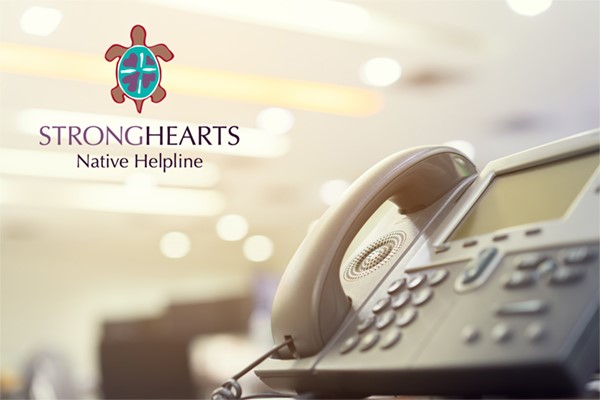
- Details
- By Native News Online Staff
EAGAN, Minn. — The StrongHearts Native Helpline, a culturally appropriate domestic and dating violence helpline for Native Americans, wants Indian Country to know the service is still in operation during the COVID-19 pandemic.
In a statement released Thursday, the organization said, “StrongHearts Native Helpline acknowledges that this is a very difficult time for all Native people. We are very concerned about those most vulnerable, including those who may be in unhealthy or abusive relationships; therefore, we will continue to operate and offer our services as long as possible.”
Counselors at the StrongHearts office are taking the directed social distancing protocols seriously.
While the service remains active, callers may experience longer call wait times. Callers may press one at any time to be transferred to The National Domestic Violence Hotline, a non-Native Hotline. The Hotline is also responding to the directed protocols so callers may experience extended call wait times.
The StrongHearts website and social media sites are not equipped for support services.
Callers may call the StrongHearts Native Helpline (1-844-7NATIVE) daily from 7 a.m. to 10 p.m. Central Daylight Time.
More Stories Like This
Native News Weekly (August 25, 2024): D.C. BriefsNavajo Nation Mourns the Passing of Former Vice President Rex Lee Jim
Deb Haaland Earns Endorsement From Communications Workers of America Local 7076
University Soccer Standout Leads by Example
Two Native Americans Named to Democratic Congressional Campaign Committee's“Red to Blue” Program
Help us defend tribal sovereignty.
At Native News Online, our mission is rooted in telling the stories that strengthen sovereignty and uplift Indigenous voices — not just at year’s end, but every single day.
Because of your generosity last year, we were able to keep our reporters on the ground in tribal communities, at national gatherings and in the halls of Congress — covering the issues that matter most to Indian Country: sovereignty, culture, education, health and economic opportunity.
That support sustained us through a tough year in 2025. Now, as we look to the year ahead, we need your help right now to ensure warrior journalism remains strong — reporting that defends tribal sovereignty, amplifies Native truth, and holds power accountable.
 The stakes couldn't be higher. Your support keeps Native voices heard, Native stories told and Native sovereignty defended.
The stakes couldn't be higher. Your support keeps Native voices heard, Native stories told and Native sovereignty defended.
Stand with Warrior Journalism today.
Levi Rickert (Potawatomi), Editor & Publisher

